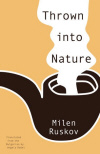Thrown into Nature
Novels that focus on contemporary foibles are often flattened in time by the ephemeral. In Thrown into Nature, Bulgarian writer Milen Ruskov sidesteps the obsolescence problem by giving us a picaresque novel set in sixteenth century Spain. Guimarães da Silva, acolyte and student, narrates his adventures with his mentor, Dr. Monardes, a true figure out of history, the “discoverer” and promoter of tobacco as the cure for whatever ails you.
Novels that focus on contemporary foibles are often flattened in time by the ephemeral. In Thrown into Nature, Bulgarian writer Milen Ruskov sidesteps the obsolescence problem by giving us a picaresque novel set in sixteenth century Spain. Guimarães da Silva, acolyte and student, narrates his adventures with his mentor, Dr. Monardes, a true figure out of history, the “discoverer” and promoter of tobacco as the cure for whatever ails you.
The work purports to be a compendium of cures attributable to this miracle drug: against intestinal worms, female swelling; driving away spirits; curing lovesickness, bad breath, aching joints; the healing of scabs, toothaches, fevers; elimination of indecision, resolution of doubts; against headaches and plague. This “cutting edge” practice sends Monardes and da Silva into contact with historical and fictional characters in full renaissance dress. As the story romps along, the author occasionally gets carried away, bringing in everyone from the Lope de Vega and Ben Jonson to the Barber of Seville, and somehow throwing in Ralph Waldo Emerson for good measure.
Delightfully translated, the work reads with deadpan zaniness out of Monty Python and the Wizard of Oz. The ironic humor is aimed at humbug, greed, and received wisdom in all its forms, afflictions that never seem to go out of style. Ruskov slyly takes on greed, jingoism, class privilege, and corruption in high places. We are also treated to a spot-on fractured take on history. Regarding the Spanish Armada: “They wanted to cleanse Spain a little. So they loaded up as much Castilian scum as they could, they loaded up misbehaving nobles, they loaded up Lope…Have you heard of Lope?” Or this: “[W]e must give up the Low Countries because…señores—we have already stolen everything valuable there.” The reader can easily see past the costumes to recognize present day analogs, yet suspension of disbelief is pleasurable and easy.
What raises this novel above a simple spoof of anachronistic science is the sometimes dubious voice of the narrator, da Silva. A Portuguese scamp passing as a Spanish aristocrat, before signing on with Dr. Monardes he made his living blowing smoke rings for money in bars. A mix of literalist, romantic and skeptic, he begins by tossing aside religion, the idea of the soul, and the unlimited potential of reason:
the world is simply mad Nature’s work…the incarnation of chaos. […] If Nature put on a human face and strolled around the streets of Sevilla, she would have long since been locked up as a dangerous maniac, perhaps even burned at the stake by the Inquisition…she alone is the procreator of the world. Not the Devil or God…
He addresses the reader directly, expressing constant adulation for his teacher even as his growing skepticism eventually blossoms into full-blown charlatanism. He also talks aloud to his secret inspiration and muse, French poet Pelletier du Mans: “Life is a strange thing, isn’t it, Pelletier? You want it and you don’t. It lures you and repulses you. Like a bitter medicine or like a sweet drink that makes your head hurt afterwards.” Required to give a smoke enema to the five year old future Felipe III, he remarks: “I imagined what would happen if he were to get the runs while I was blowing tobacco fumes into the tube. In Sevilla there is a man everyone calls Shit Mouth, thanks to his habit of always making gloomy prophesies but, of course, this expression could also have a literal meaning.”
Meanwhile, the self-described “humanist and renaissance man” Monardes holds forth about bodily humours, blockages and the unlimited properties of tobacco in restoring balance. He travels to England to engage in a debate on tobacco duly reported by his assistant in a hilarious chapter entitled: “On the Debate by the Honorable, Learned Scholars Dr. Cheynell, an Englishman, and Dr. Monardes, A Spaniard, with the Foolish and Ignorant English King and His Sycophantic Servants Who Present Themselves before the Civilized World as Physicians—to Their and Their Chieftain’s Great Shame.”
But the reader can see that Monardes leads his patients and da Silva down the path of logical fallacy, consistently confounding association with causation, his own smooth bedside manner being one of the principle confounding variables. In the end, da Silva’s take on chaotic Nature has the last word as he deduces that the miracle cure is slowly killing his mentor. Yet this does not prevent him from seizing the opportunity to carry on the “great work” when Monardes succumbs. There is a dark Eastern European cynicism behind the drollery here.





